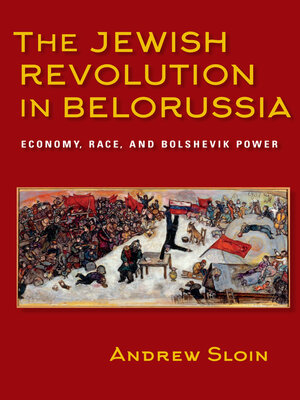The Jewish Revolution in Belorussia
ebook ∣ Economy, Race, and Bolshevik Power · The Modern Jewish Experience
By Andrew Sloin

Sign up to save your library
With an OverDrive account, you can save your favorite libraries for at-a-glance information about availability. Find out more about OverDrive accounts.
Find this title in Libby, the library reading app by OverDrive.



Search for a digital library with this title
Title found at these libraries:
| Library Name | Distance |
|---|---|
| Loading... |
A Dorothy Rosenberg Prize–winner: "A remarkable social history that investigates the process of Sovietization among Jews in Belorussia” (Jeffrey Veidlinger, author of In the Shadow of the Shtetl).
This insightful history demonstrates how Jewish life in Belorussia fundamentally changed when Jews started joining the Bolshevik movement and populating the front lines of the revolutionary struggle. While Andrew Sloin’s story follows the arc of Bolshevik history, it also shows how the broader movement was enacted in factories and workshops, workers’ clubs and union meetings, and on the Jewish streets of White Russia.
In the eyes of the Bolshevik leadership, the project of transforming Jews into integrated Soviet citizens was bound inextricably to labor. The protagonists here are shoemakers, speculators, glassmakers, peddlers, leatherworkers, needleworkers, soldiers, students, and local party operatives who were swept up, willingly or otherwise, under the banner of Marxist socialism. With extensive research and keen insight, Sloin stresses the fundamental relationship between economy and identity formation as party officials grappled with the Jewish Question in the wake of the revolution.
This insightful history demonstrates how Jewish life in Belorussia fundamentally changed when Jews started joining the Bolshevik movement and populating the front lines of the revolutionary struggle. While Andrew Sloin’s story follows the arc of Bolshevik history, it also shows how the broader movement was enacted in factories and workshops, workers’ clubs and union meetings, and on the Jewish streets of White Russia.
In the eyes of the Bolshevik leadership, the project of transforming Jews into integrated Soviet citizens was bound inextricably to labor. The protagonists here are shoemakers, speculators, glassmakers, peddlers, leatherworkers, needleworkers, soldiers, students, and local party operatives who were swept up, willingly or otherwise, under the banner of Marxist socialism. With extensive research and keen insight, Sloin stresses the fundamental relationship between economy and identity formation as party officials grappled with the Jewish Question in the wake of the revolution.







